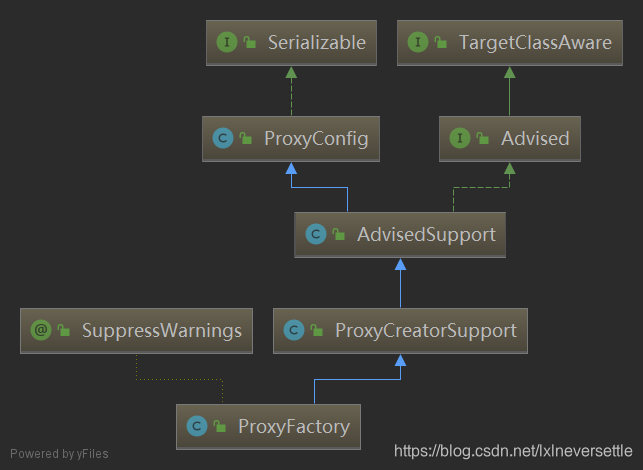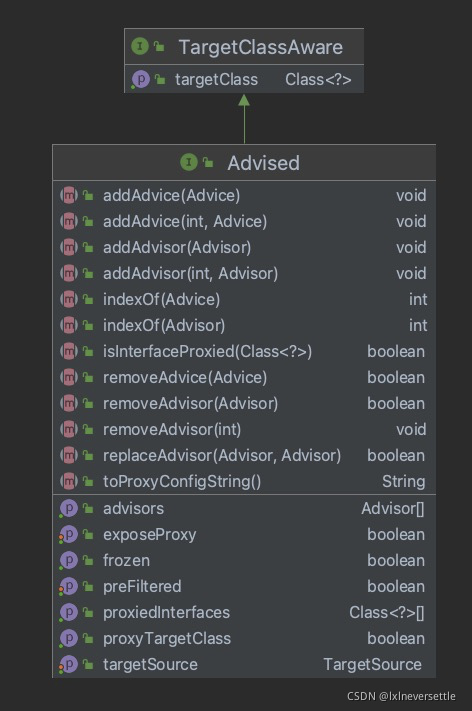ProxyFactory源码
实例
public class Aop {
public static void main(String[] args) {
IUser user = new User();
ProxyFactory factory = new ProxyFactory();
factory.setTarget(user);
factory.setInterfaces(IUser.class);
factory.addAdvice(new LogAdvice());
factory.addAdvice(new Log2Advice());
factory.addAdvice(new AfterReturningAdviceInterceptor(new AfterReturningAdvice() {
@Override
public void afterReturning(Object returnValue, Method method, Object[] args, Object target) throws Throwable {
System.out.println("clearn-----------------");
}
}));
IUser proxyUser = (IUser) factory.getProxy();
proxyUser.echo();
}
}
public interface IUser {
public void echo();
}
public class LogAdvice implements MethodBeforeAdvice {
@Override
public void before(Method method, Object[] args, Object target) throws Throwable {
System.out.println("log----------");
}
}
public class Log2Advice implements MethodBeforeAdvice {
@Override
public void before(Method method, Object[] args, Object target) throws Throwable {
System.out.println("log2----------------");
}
}
public class User implements IUser{
public void echo(){
System.out.println("lixinlei");
}
}
源码分析
首先看一下ProxyFactory的继承层次

Advised主要提供了Advisor的管理类
ProxyConfig则提供了生成代理对象的配置管理
ProxyFactory因此可以添加Advisor和管理代理对象的配置
Advised

ProxyConfig
ProxyConfig主要用来提供生成代理对象相关的属性
public class ProxyConfig implements Serializable {
/** use serialVersionUID from Spring 1.2 for interoperability */
private static final long serialVersionUID = -8409359707199703185L;
// 使用使用cglib来生成代理
private boolean proxyTargetClass = false;
// 判断是否需要进行优化,如果需要进行优化,当代理对象创建之后将不能添加advisor另外会使用cglib来生成代理对象
private boolean optimize = false;
// 是否可以强制转换成Advised
boolean opaque = false;
// 当生成代理对象之后,将代理对象放入到线程本地变量中,供被代理对象访问
boolean exposeProxy = false;
// 当设置frozen之后,无法对对配置进行修改,比如无法添加Advisor和移除Advisor
private boolean frozen = false;
}
ProxyFactory
构造方法
public ProxyFactory(Object target) {
// 使用目标对象,创建一个SingletonTargetSource
setTarget(target);
// 获取目标对象实现的所有接口,设置为代理对象需要实现的接口
setInterfaces(ClassUtils.getAllInterfaces(target));
}
public ProxyFactory(Class<?>... proxyInterfaces) {
setInterfaces(proxyInterfaces);
}
public ProxyFactory(Class<?> proxyInterface, Interceptor interceptor) {
addInterface(proxyInterface);
// 设置增强逻辑
addAdvice(interceptor);
}
public ProxyFactory(Class<?> proxyInterface, TargetSource targetSource) {
addInterface(proxyInterface);
setTargetSource(targetSource);
}
getProxy
public Object getProxy() {
return createAopProxy().getProxy();
}
protected final synchronized AopProxy createAopProxy() {
if (!this.active) {
activate();
}
// 获取配置使用的AopProxyFactory,如果没有设置,默认情况下是DefaultAopProxyFactory
return getAopProxyFactory().createAopProxy(this);
}
接着看下DefaultAopProxyFactory的createAopProxy
public AopProxy createAopProxy(AdvisedSupport config) throws AopConfigException {
// 根据配置来决定使用哪种代理生成方式
// 一下三种情况会尝试使用cglib方式来生成代理
// config设置optimize为true
// config设置proxyTargetClass为true
// config中没有设置需要代理的接口
if (config.isOptimize() || config.isProxyTargetClass() || hasNoUserSuppliedProxyInterfaces(config)) {
Class<?> targetClass = config.getTargetClass();
if (targetClass == null) {
throw new AopConfigException("TargetSource cannot determine target class: " +
"Either an interface or a target is required for proxy creation.");
}
// 如果目标类本身是一个接口或者该类实现了Proxy
// 使用jdk原生的代理方式
if (targetClass.isInterface() || Proxy.isProxyClass(targetClass)) {
return new JdkDynamicAopProxy(config);
}
// 使用cglib来生成代理
return new ObjenesisCglibAopProxy(config);
}
else {
return new JdkDynamicAopProxy(config);
}
}
JdkDynamicAopProxy
JdkDynamicAopProxy使用的是jdk原生提供的代理生成能力,其实现了InvocationHandler接口

getProxy
public Object getProxy(ClassLoader classLoader) {
if (logger.isDebugEnabled()) {
logger.debug("Creating JDK dynamic proxy: target source is " + this.advised.getTargetSource());
}
Class<?>[] proxiedInterfaces = AopProxyUtils.completeProxiedInterfaces(this.advised, true);
findDefinedEqualsAndHashCodeMethods(proxiedInterfaces);
return Proxy.newProxyInstance(classLoader, proxiedInterfaces, this);
}
completeProxiedInterfaces
用来生成全部需要进行代理的接口集合
static Class<?>[] completeProxiedInterfaces(AdvisedSupport advised, boolean decoratingProxy) {
// 从配置中获取需要代理的接口
Class<?>[] specifiedInterfaces = advised.getProxiedInterfaces();
if (specifiedInterfaces.length == 0) {
// No user-specified interfaces: check whether target class is an interface.
// 没有手动指定需要代理的接口
Class<?> targetClass = advised.getTargetClass();
if (targetClass != null) {
// 目标类本身是一个接口
// 将该接口设置为需要代理的接口
if (targetClass.isInterface()) {
advised.setInterfaces(targetClass);
}
else if (Proxy.isProxyClass(targetClass)) {
// 目标类实现了Proxy接口,将当前类实现的所有接口作为需要代理的接口
advised.setInterfaces(targetClass.getInterfaces());
}
specifiedInterfaces = advised.getProxiedInterfaces();
}
}
// 判断SpringProxy是否需要代理
boolean addSpringProxy = !advised.isInterfaceProxied(SpringProxy.class);
// 如果配置中opaque设置为false从而需要将代理强转为Advised,并且Advise接口本身不在需要代理的接口集合中
boolean addAdvised = !advised.isOpaque() && !advised.isInterfaceProxied(Advised.class);
// 判断是否需要代理DecoratingProxy接口
boolean addDecoratingProxy = (decoratingProxy && !advised.isInterfaceProxied(DecoratingProxy.class));
int nonUserIfcCount = 0;
if (addSpringProxy) {
nonUserIfcCount++;
}
if (addAdvised) {
nonUserIfcCount++;
}
if (addDecoratingProxy) {
nonUserIfcCount++;
}
// 重新生成需要代理的接口数组
Class<?>[] proxiedInterfaces = new Class<?>[specifiedInterfaces.length + nonUserIfcCount];
System.arraycopy(specifiedInterfaces, 0, proxiedInterfaces, 0, specifiedInterfaces.length);
int index = specifiedInterfaces.length;
if (addSpringProxy) {
proxiedInterfaces[index] = SpringProxy.class;
index++;
}
if (addAdvised) {
proxiedInterfaces[index] = Advised.class;
index++;
}
if (addDecoratingProxy) {
proxiedInterfaces[index] = DecoratingProxy.class;
}
return proxiedInterfaces;
}
findDefinedEqualsAndHashCodeMethods
private void findDefinedEqualsAndHashCodeMethods(Class<?>[] proxiedInterfaces) {
// 遍历需要代理的接口
for (Class<?> proxiedInterface : proxiedInterfaces) {
// 遍历当前接口声明的方法
Method[] methods = proxiedInterface.getDeclaredMethods();
for (Method method : methods) {
// 判断是否是equals方法
if (AopUtils.isEqualsMethod(method)) {
this.equalsDefined = true;
}
// 判断是否是hashCode方法
if (AopUtils.isHashCodeMethod(method)) {
this.hashCodeDefined = true;
}
if (this.equalsDefined && this.hashCodeDefined) {
return;
}
}
}
}
handle
getProxy方法中,在创建代理对象的时候,会将JdkDynamicAopProxy本身作为增强,因此看下invoke方法来看下增强逻辑
public Object invoke(Object proxy, Method method, Object[] args) throws Throwable {
MethodInvocation invocation;
Object oldProxy = null;
boolean setProxyContext = false;
TargetSource targetSource = this.advised.targetSource;
Class<?> targetClass = null;
Object target = null;
try {
// 当前调用的方法是equlas并且目标类本身没有实现equals方法
if (!this.equalsDefined && AopUtils.isEqualsMethod(method)) {
// The target does not implement the equals(Object) method itself.
// 调用JdkDynamicAopProxy的equals
return equals(args[0]);
}
// 当前调用的方法是hashCode并且目标类本身没有实现hashCode方法
else if (!this.hashCodeDefined && AopUtils.isHashCodeMethod(method)) {
// The target does not implement the hashCode() method itself.
// 调用JdkDynamicAopProxy的hashCode
return hashCode();
}
// 调用的是DecoratingProxy定义的方法
else if (method.getDeclaringClass() == DecoratingProxy.class) {
// There is only getDecoratedClass() declared -> dispatch to proxy config.
return AopProxyUtils.ultimateTargetClass(this.advised);
}
// 当前调用的是Advised接口的方法,并且配置设置为可以强转为Advised
else if (!this.advised.opaque && method.getDeclaringClass().isInterface() &&
method.getDeclaringClass().isAssignableFrom(Advised.class)) {
// Service invocations on ProxyConfig with the proxy config...
// 将请求代理到配置advised上
return AopUtils.invokeJoinpointUsingReflection(this.advised, method, args);
}
Object retVal;
// 配置中设置需要暴露代理对象,将代理对象设置到线程本地变量中
if (this.advised.exposeProxy) {
// Make invocation available if necessary.
oldProxy = AopContext.setCurrentProxy(proxy);
setProxyContext = true;
}
// May be null. Get as late as possible to minimize the time we "own" the target,
// in case it comes from a pool.
// 记录目标类的类型
target = targetSource.getTarget();
if (target != null) {
targetClass = target.getClass();
}
// Get the interception chain for this method.
// 创建interception链
List<Object> chain = this.advised.getInterceptorsAndDynamicInterceptionAdvice(method, targetClass);
// Check whether we have any advice. If we don't, we can fallback on direct
// reflective invocation of the target, and avoid creating a MethodInvocation.
if (chain.isEmpty()) {
// We can skip creating a MethodInvocation: just invoke the target directly
// Note that the final invoker must be an InvokerInterceptor so we know it does
// nothing but a reflective operation on the target, and no hot swapping or fancy proxying.
// 不需要进行增强
// 对参数进行转换
Object[] argsToUse = AopProxyUtils.adaptArgumentsIfNecessary(method, args);
// 通过反射直接调用目标对象的方法
retVal = AopUtils.invokeJoinpointUsingReflection(target, method, argsToUse);
}
else {
// We need to create a method invocation...
// 需要进行增强,创建ReflectiveMethodInvocation,并执行
invocation = new ReflectiveMethodInvocation(proxy, target, method, args, targetClass, chain);
// Proceed to the joinpoint through the interceptor chain.
retVal = invocation.proceed();
}
// Massage return value if necessary.
Class<?> returnType = method.getReturnType();
if (retVal != null && retVal == target &&
returnType != Object.class && returnType.isInstance(proxy) &&
!RawTargetAccess.class.isAssignableFrom(method.getDeclaringClass())) {
// Special case: it returned "this" and the return type of the method
// is type-compatible. Note that we can't help if the target sets
// a reference to itself in another returned object.
retVal = proxy;
}
else if (retVal == null && returnType != Void.TYPE && returnType.isPrimitive()) {
throw new AopInvocationException(
"Null return value from advice does not match primitive return type for: " + method);
}
return retVal;
}
finally {
if (target != null && !targetSource.isStatic()) {
// Must have come from TargetSource.
targetSource.releaseTarget(target);
}
if (setProxyContext) {
// Restore old proxy.
AopContext.setCurrentProxy(oldProxy);
}
}
}
getInterceptorsAndDynamicInterceptionAdvice
public List<Object> getInterceptorsAndDynamicInterceptionAdvice(Method method, Class<?> targetClass) {
// 缓存interception chain
MethodCacheKey cacheKey = new MethodCacheKey(method);
List<Object> cached = this.methodCache.get(cacheKey);
if (cached == null) {
cached = this.advisorChainFactory.getInterceptorsAndDynamicInterceptionAdvice(
this, method, targetClass);
this.methodCache.put(cacheKey, cached);
}
return cached;
}
public List<Object> getInterceptorsAndDynamicInterceptionAdvice(
Advised config, Method method, Class<?> targetClass) {
// This is somewhat tricky... We have to process introductions first,
// but we need to preserve order in the ultimate list.
// 获取配置中的advisor
List<Object> interceptorList = new ArrayList<Object>(config.getAdvisors().length);
Class<?> actualClass = (targetClass != null ? targetClass : method.getDeclaringClass());
// 判断是否需要做introduction
boolean hasIntroductions = hasMatchingIntroductions(config, actualClass);
AdvisorAdapterRegistry registry = GlobalAdvisorAdapterRegistry.getInstance();
for (Advisor advisor : config.getAdvisors()) {
if (advisor instanceof PointcutAdvisor) {
// Add it conditionally.
PointcutAdvisor pointcutAdvisor = (PointcutAdvisor) advisor;
// config.isPreFiltered返回true,代表config中的所有advisor都是适用于当前目标对象的
// 判断当前advisor需要对当前目标对象进行增强
if (config.isPreFiltered() || pointcutAdvisor.getPointcut().getClassFilter().matches(actualClass)) {
// 方法匹配
MethodMatcher mm = pointcutAdvisor.getPointcut().getMethodMatcher();
if (MethodMatchers.matches(mm, method, actualClass, hasIntroductions)) {
// 将当前advisor包含的advice转换成MethodInterceptor
MethodInterceptor[] interceptors = registry.getInterceptors(advisor);
// 如果MethodMatcher的runtime是true,那么代表在进行是否需要增强的时候,需要考虑参数
if (mm.isRuntime()) {
// Creating a new object instance in the getInterceptors() method
// isn't a problem as we normally cache created chains.
// 单独将需要考虑参数的MethodMatcher下面的advice转换成InterceptorAndDynamicMethodMatcher
for (MethodInterceptor interceptor : interceptors) {
interceptorList.add(new InterceptorAndDynamicMethodMatcher(interceptor, mm));
}
}
else {
// 将advice转换成的interceptor加入到最终结果中
interceptorList.addAll(Arrays.asList(interceptors));
}
}
}
}
// 相同的方法处理IntroductionAdvisor
else if (advisor instanceof IntroductionAdvisor) {
IntroductionAdvisor ia = (IntroductionAdvisor) advisor;
if (config.isPreFiltered() || ia.getClassFilter().matches(actualClass)) {
Interceptor[] interceptors = registry.getInterceptors(advisor);
interceptorList.addAll(Arrays.asList(interceptors));
}
}
else {
Interceptor[] interceptors = registry.getInterceptors(advisor);
interceptorList.addAll(Arrays.asList(interceptors));
}
}
return interceptorList;
}
getInterceptors
下面看下DefaultAdvisorAdapterRegistry中的getInterceptors是如何将各种类型的advisor转换成MethodInterceptor的
public MethodInterceptor[] getInterceptors(Advisor advisor) throws UnknownAdviceTypeException {
List<MethodInterceptor> interceptors = new ArrayList<MethodInterceptor>(3);
Advice advice = advisor.getAdvice();
// 如果advice本身就是MethodInterceptor,不做处理
if (advice instanceof MethodInterceptor) {
interceptors.add((MethodInterceptor) advice);
}
// 使用AdvisorAdapter对advice进行转换
for (AdvisorAdapter adapter : this.adapters) {
if (adapter.supportsAdvice(advice)) {
interceptors.add(adapter.getInterceptor(advisor));
}
}
if (interceptors.isEmpty()) {
throw new UnknownAdviceTypeException(advisor.getAdvice());
}
return interceptors.toArray(new MethodInterceptor[interceptors.size()]);
}
DefaultAdvisorAdapterRegistry构造的时候会添加如下三个adapter,分别将MethodBeforeAdvice,AfterReturningAdvice和ThrowsAdvice转换成MethodInterceptor
public DefaultAdvisorAdapterRegistry() {
registerAdvisorAdapter(new MethodBeforeAdviceAdapter());
registerAdvisorAdapter(new AfterReturningAdviceAdapter());
registerAdvisorAdapter(new ThrowsAdviceAdapter());
}
MethodBeforeAdviceAdapter
代码比较简单,直接看代码
class MethodBeforeAdviceAdapter implements AdvisorAdapter, Serializable {
@Override
public boolean supportsAdvice(Advice advice) {
return (advice instanceof MethodBeforeAdvice);
}
@Override
public MethodInterceptor getInterceptor(Advisor advisor) {
MethodBeforeAdvice advice = (MethodBeforeAdvice) advisor.getAdvice();
return new MethodBeforeAdviceInterceptor(advice);
}
}
public class MethodBeforeAdviceInterceptor implements MethodInterceptor, BeforeAdvice, Serializable {
private final MethodBeforeAdvice advice;
/**
* Create a new MethodBeforeAdviceInterceptor for the given advice.
* @param advice the MethodBeforeAdvice to wrap
*/
public MethodBeforeAdviceInterceptor(MethodBeforeAdvice advice) {
Assert.notNull(advice, "Advice must not be null");
this.advice = advice;
}
@Override
public Object invoke(MethodInvocation mi) throws Throwable {
// 在执行target真实逻辑之前,执行advice的before逻辑
this.advice.before(mi.getMethod(), mi.getArguments(), mi.getThis());
return mi.proceed();
}
}
AfterReturningAdviceAdapter
class AfterReturningAdviceAdapter implements AdvisorAdapter, Serializable {
@Override
public boolean supportsAdvice(Advice advice) {
return (advice instanceof AfterReturningAdvice);
}
@Override
public MethodInterceptor getInterceptor(Advisor advisor) {
AfterReturningAdvice advice = (AfterReturningAdvice) advisor.getAdvice();
return new AfterReturningAdviceInterceptor(advice);
}
}
public class AfterReturningAdviceInterceptor implements MethodInterceptor, AfterAdvice, Serializable {
private final AfterReturningAdvice advice;
/**
* Create a new AfterReturningAdviceInterceptor for the given advice.
* @param advice the AfterReturningAdvice to wrap
*/
public AfterReturningAdviceInterceptor(AfterReturningAdvice advice) {
Assert.notNull(advice, "Advice must not be null");
this.advice = advice;
}
@Override
public Object invoke(MethodInvocation mi) throws Throwable {
Object retVal = mi.proceed();
// 在target执行完真实逻辑之后,执行afterReturning
this.advice.afterReturning(retVal, mi.getMethod(), mi.getArguments(), mi.getThis());
return retVal;
}
}
ThrowsAdviceAdapter
class ThrowsAdviceAdapter implements AdvisorAdapter, Serializable {
@Override
public boolean supportsAdvice(Advice advice) {
return (advice instanceof ThrowsAdvice);
}
@Override
public MethodInterceptor getInterceptor(Advisor advisor) {
return new ThrowsAdviceInterceptor(advisor.getAdvice());
}
}
public class ThrowsAdviceInterceptor implements MethodInterceptor, AfterAdvice {
// 省略
@Override
public Object invoke(MethodInvocation mi) throws Throwable {
try {
return mi.proceed();
}
catch (Throwable ex) {
Method handlerMethod = getExceptionHandler(ex);
if (handlerMethod != null) {
invokeHandlerMethod(mi, ex, handlerMethod);
}
throw ex;
}
}
}
proceed
通过递归的方式来执行所有增强,一层包着一层,最里面是目标对象的执行逻辑
public Object proceed() throws Throwable {
// We start with an index of -1 and increment early.
// 执行完增强逻辑,执行目标对象的真正逻辑
if (this.currentInterceptorIndex == this.interceptorsAndDynamicMethodMatchers.size() - 1) {
return invokeJoinpoint();
}
// 获取当前的增强
Object interceptorOrInterceptionAdvice =
this.interceptorsAndDynamicMethodMatchers.get(++this.currentInterceptorIndex);
// 之前讲过,当MethodMatcher的runtime返回true,代表需要考虑参数来决定是否进行增强时,会将Advice转换成InterceptorAndDynamicMethodMatcher
if (interceptorOrInterceptionAdvice instanceof InterceptorAndDynamicMethodMatcher) {
// Evaluate dynamic method matcher here: static part will already have
// been evaluated and found to match.
InterceptorAndDynamicMethodMatcher dm =
(InterceptorAndDynamicMethodMatcher) interceptorOrInterceptionAdvice;
// 判断参数是否匹配
if (dm.methodMatcher.matches(this.method, this.targetClass, this.arguments)) {
return dm.interceptor.invoke(this);
}
else {
// Dynamic matching failed.
// Skip this interceptor and invoke the next in the chain.
return proceed();
}
}
else {
// 其他类型的interceptor
// It's an interceptor, so we just invoke it: The pointcut will have
// been evaluated statically before this object was constructed.
return ((MethodInterceptor) interceptorOrInterceptionAdvice).invoke(this);
}
}





 本文深入探讨Spring框架中的AOP实现原理,详细分析ProxyFactory类的构造过程及如何生成代理对象,包括JDK动态代理与CGLIB代理的选择机制。同时,介绍了Advisor与Advice的转换流程,以及MethodInterceptor的创建与执行机制。
本文深入探讨Spring框架中的AOP实现原理,详细分析ProxyFactory类的构造过程及如何生成代理对象,包括JDK动态代理与CGLIB代理的选择机制。同时,介绍了Advisor与Advice的转换流程,以及MethodInterceptor的创建与执行机制。
















 308
308

 被折叠的 条评论
为什么被折叠?
被折叠的 条评论
为什么被折叠?








